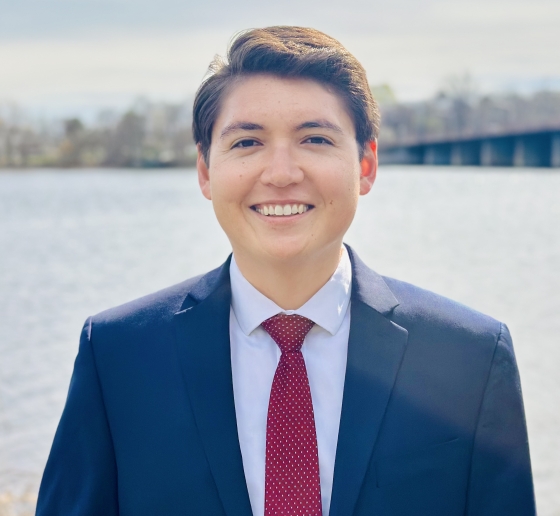Joseph R. Landry ’16 Awarded Supreme Court Clerkship
Landry will clerk for Justice Ketanji Brown Jackson for the October 2024 term.

Joseph R. Landry ’16 had already completed two federal clerkships and worked for several years as a labor lawyer when Ketanji Brown Jackson was nominated for the Supreme Court in 2022. But watching Jackson’s confirmation hearing inspired Landry to apply for a third year of clerking, this time with her.
In July, he will begin a clerkship with the newest justice for the Supreme Court’s October 2024 term.
“Justice Jackson has shown integrity, thoughtfulness, and commitment to our nation's foundational promises throughout her career in public service,” Landry says. “It is the honor of a lifetime to serve as her law clerk. I am beyond grateful to her for giving me this opportunity.”
Landry is the second member of the Columbia Law community to clerk for Justice Jackson: Associate Professor of Law Kerrel Murray clerked for the justice during the October 2022 term. (Murray had previously been Jackson’s law clerk when she was on the U.S. District Court for the District of Columbia.)
Landry grew up in New Hampshire and earned his undergraduate degree at Washington and Lee University. He came to Columbia Law with the goal of practicing labor law.
Landry was inspired in part by his parents and late grandparents. “They instilled in me the values that I try to carry forward. … They are really my heroes in life,” he says. “They were union members. My father was a pipe fitter, and my mother was a teacher … my grandparents: a laborer, a secretary, a bakery worker, and a factory worker.” Hearing about their work experiences led Landry to labor law. “I was interested in a career that solves problems, helps others, and stays true to the authentic voices of working people. And, in my experience, labor law is one area that achieves those aims.”
He was especially inspired by his grandmother Hanako. “She taught all of us to live by the ‘three H’s,’ which are to be humble, honest, and hard-working in everything that you do,” Landry explains.
While at Columbia Law, Landry received the John Ordronaux Prize, awarded for the highest academic average in his graduating class, and the Emil Schlesinger Labor Law Prize. He was an articles editor for the Columbia Law Review and a recipient of the Michael Weiner Scholarship for Labor Studies from the Major League Baseball Players Trust.
He also served as a teaching assistant for Jody Kraus, Alfred McCormack Professor of Law, in his Contracts class and as a research assistant for Jessica Bulman-Pozen, Betts Professor of Law. His summer work included positions with the Communications Workers of America and Altshuler Berzon, a San Francisco public interest law firm.
For their help at different stages in the process, Landry thanks Murray; Andrea Saavedra ’06, associate dean for registration and student services and former assistant dean of judicial careers; and the Office of Judicial Careers. He also is especially grateful to his mentors, Bulman-Pozen, Vincent Blasi, Corliss Lamont Professor of Civil Liberties, and Lance Liebman, William S. Beinecke Professor of Law Emeritus and Dean Emeritus, for their continuing advice, insight, and support over the years.
“Joe’s academic and practical qualifications are sterling, but I was perhaps struck more by his equanimity, perspective, and discipline,” Murray says. “I’m thrilled for him and thrilled that he’ll be bringing those qualities to bear as a clerk for Justice Jackson.”
Bulman-Pozen taught Landry as a 2L in her administrative law class, where he wrote the top-scoring exam. “I wasn’t surprised: Every time I had called on him, he’d been incredibly impressive,” she says. “But he is one of the most unassuming, humble people I have encountered.” Bulman-Pozen selected Landry as a research assistant and discovered him to be not only a “lucid writer” but a “diligent and creative researcher.” She says he “has a blend of brilliance and acuity and humility and concern for others that is very special.”
After graduating from Columbia Law, Landry clerked for Judge James B. Loken of the U.S. Court of Appeals, 8th Circuit, and U.S. District Court Judge Indira Talwani of the U.S. District Court for the District of Massachusetts—experiences he loved. “I like learning what really matters in the cases. I like learning how to be an effective advocate,” he says. “I like the variety, complexity, and the magnitude of the cases that come before the court.” Most of all, Landry says, “I am grateful I had the opportunity to learn the legal craft from two extraordinary judges.”
Following his clerkships, Landry joined the U.S. Department of Labor as a trial attorney in its Boston regional solicitor’s office where he litigated cases involving working conditions, pay practices, and workplace retaliation in federal courts across New England. Through his trial work, he has seen “the law, and the ideals and principles embedded in that law, interact with real life,” Landry says. “The best part of this work has been seeing how it matters to real people.” Landry credits the office with building him into a litigator. “I am so thankful to my colleagues and proud to have been part of such a dedicated and effective team of public servants.”
For now, Landry is focused on planning his move to Washington, D.C., with his wife, Natasha, a public health researcher, and baby, Hanako, named for her great-grandmother. Landry spent time in Washington as a college intern, but the day he interviewed with Jackson was the first time he stepped inside the Supreme Court. Just to talk with the justice “was a great privilege,” he says. “I am overjoyed to work for her and learn from her over the upcoming term.”